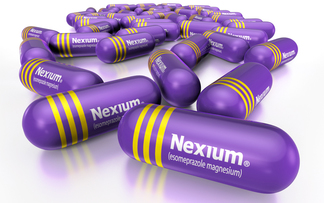Proton Pump Inhibitors May Reduce Efficacy of Capecitabine

Jonathan Goodman
October 17, 2016
Proton pump inhibitors (PPIs) may reduce the efficacy of capecitabine as a treatment for gastroesophageal cancer, according to a study analysis published in JAMA Oncology.1
It is unknown the degree to which one's gastric pH levels affect the absorption of orally-administered anticancer drugs. The TRIO-013/LOGiC (Lapatinib Optimization Study in ErbB2 (HER2) Positive Gastric Cancer: A Phase III Global, Blinded Study Designed to Evaluate Clinical Endpoints and Safety of Chemotherapy Plus Lapatinib; ClinicalTrials.gov Identifier: NCT00680901) compared the efficacy of capecitabine and oxaliplatin with lapatinib versus without lapatinib among patients with gastroesophageal cancer. In the present analysis, researchers evaluated whether PPIs affected gastric pH levels and treatment efficacy.
Median progression-free and overall survivals were longer for those in the control group (no lapatinib) who did not receive PPIs. There was no significant survival difference between PPI- and non-PPI-treated patients in the lapatinib group.
The authors of this analysis conclude that PPIs may lower the efficacy of capecitabine. Physicians and drug developers should be wary of the use of oral chemotherapy treatments, as orally-administered drugs have a greater number of interactions before entering the bloodstream than drugs administered by other methods.
The pharmacokinetics were not, however, examined in this analysis, so no specific causal factor can be attributed to the reduced efficacy of capecitabine in this patient population.
Reference
Comment:
Reducing the acid inhibits the bodies ability do absorb all nutrients and minerals as well as drugs.
Read More
October 17, 2016
Proton pump inhibitors (PPIs) may reduce the efficacy of capecitabine as a treatment for gastroesophageal cancer, according to a study analysis published in JAMA Oncology.1
It is unknown the degree to which one's gastric pH levels affect the absorption of orally-administered anticancer drugs. The TRIO-013/LOGiC (Lapatinib Optimization Study in ErbB2 (HER2) Positive Gastric Cancer: A Phase III Global, Blinded Study Designed to Evaluate Clinical Endpoints and Safety of Chemotherapy Plus Lapatinib; ClinicalTrials.gov Identifier: NCT00680901) compared the efficacy of capecitabine and oxaliplatin with lapatinib versus without lapatinib among patients with gastroesophageal cancer. In the present analysis, researchers evaluated whether PPIs affected gastric pH levels and treatment efficacy.
Median progression-free and overall survivals were longer for those in the control group (no lapatinib) who did not receive PPIs. There was no significant survival difference between PPI- and non-PPI-treated patients in the lapatinib group.
The authors of this analysis conclude that PPIs may lower the efficacy of capecitabine. Physicians and drug developers should be wary of the use of oral chemotherapy treatments, as orally-administered drugs have a greater number of interactions before entering the bloodstream than drugs administered by other methods.
The pharmacokinetics were not, however, examined in this analysis, so no specific causal factor can be attributed to the reduced efficacy of capecitabine in this patient population.
Reference
- Chu MP, Hecht JR, Slamon D, et al. Association of proton pump inhibitors and capecitabine efficacy in advanced gastroesophageal cancer: secondary analysis of the TRIO-013/LOGiC randomized clinical trial. JAMA Oncol. 2016 Oct 13. doi:10.1001/jamaoncol.2016.3358 [Epub ahead of print]
Comment:
Reducing the acid inhibits the bodies ability do absorb all nutrients and minerals as well as drugs.
Read More
